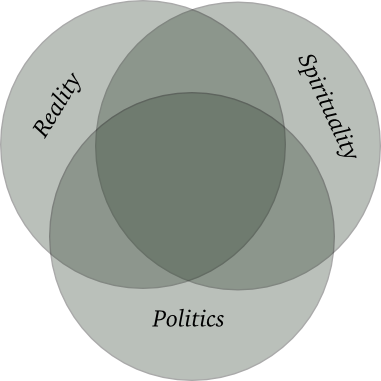
LET'S BEGIN AGAIN—THIS TIME with the worst possible spiritual predicament.
Let's assume, for the sake of argument, that you knew, or at least had a persistent suspicion, that you were bad.
"Bad" could mean any number of things—selfish, lazy, stupid, addictive, it doesn't really matter how you define it.
The point is, that you believe that you, yourself, are—in some important and basic way—something that you, yourself, disapprove of.
You are, in some sense, fundamentally at odds with yourself.
Imagine how this would incapacitate you, not wanting to want what you want, not wanting to do what you do.
Not approving of yourself.
Chances are that you would alternate between self-criticism on some days and denial on others.
You would find ways to lie to yourself about your real, bad, nature—and probably do things to keep others from finding out.
Occasionally the "bad you" might surface, in an act of rebellion against the "judgmental you".
You might find yourself thinking "I don't care what anyone thinks, I'm just going to be who I am and let the chips fall where they may."
You might find yourself very angry under the surface, you might feel oppressed, you might feel ready to strike out.
You might find yourself projecting your own self-judgment on others, believing that they are judging you when in fact they aren't.
In these moments your rebellion might cause you to over-react, to do things that even the "bad" you would never have done or said, except as a reaction to all that self-criticism.
And this would convince you even more that your suspicions about your basic nature were correct, that you had better keep a very watchful eye, and a tight rein, on the real you, because look what happens when it gets out.
And, if you had this kind of internal experience of yourself, what kind of assumptions would you make about the goodness or badness of others ?
Wouldn't you be more ready to assume that they were selfish, or lazy, or judgmental?
Wouldn't you be more suspicious of their motives?
Wouldn't you feel compelled to find a set of rules to live by, since you, yourself, could not be trusted, and wouldn't you want to require others to live by them as well?
What I have just described, of course, is a part of the experience of most normal human beings.
One thing our culture teaches all of us—to one degree or another—is that we are defective.
The Christian Fundamentalism I grew up with was specific and open about it: they called it "original sin".
One evangelical organization even called it a "spiritual law" that humans were "sinful, and separated from God."
Roman Catholics call it the total depravity of man .
But it isn't always explicit.
Every time a child is given the impression that they are being "bad" when they are simply being inconvenient to an adult, whether it's a matter of...
-
putting oatmeal in their hair, or
-
being too loud in a restaurant, or
-
not getting ready fast enough, or
-
not being focused enough on their homework, or
-
anything else someone else thinks they should or shouldn't be doing, but which is completely appropriate to their age and stage,
...that child is being given the message that there is something "wrong" with them.
Before I incite all sorts of resistance to what I'm saying, let me clarify a few things:
-
I am not implying that children ought to be allowed to run amok in public places.
-
I am not implying that adults have no rights.
-
I am not implying that grownups shouldn't teach their children how to navigate the world.
My point is quite different.
The standard paradigm for child raising in most modern cultures assumes that what the adults want, in almost every situation, is not only more important that what the child wants, but is right.
And what the child wants is wrong.
It's exactly the same paradigm we use when we train a dog.
Even children who are brought up by parents who consciously avoid sending that message will run into it elsewhere in the culture.
We can't avoid it.
What did that message, repeated many times a day, say to your own developing self when you were a child?
It said that your natural instincts were bad, and that good was achieved by overruling those instincts.
It taught you that you were not to be trusted.
It made you feel less than completely at home in your own life.
And it kept your natural instincts from developing into a mature, trustworthy guide, so that they could be trusted.
Those messages continue to come at us our entire life.
They come until we say "I'm being bad" when we eat a piece of cake, or have a drink, or stop work early because we're exhausted.
But more about that next time...






